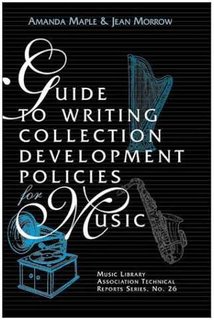
Abstract: Amanda Maple and Jean Morrow, Guide to Writing Collectiion Development Policies for Music, Music Library Association Technical Reports, no. 26 (Lanham, MD: Scarecrow Press, 2001).
As mentioned in this book's preface, this volume is adapted in part from the American Library Association's Guide for Written Collection Policy Statements (1996), and should only serve to highlight specifics regarding music collections in print, electronic, and recorded media. The format of the book is simple:
- a checklist outlining the types of information that should be included in a music library's collection development policy
- an outline of a sample written policy with examples taken from various types of music libraries (research university, conservatory, liberal arts college, sound archives, public library, etc.)
- a complete collection development policy for Middlebury College Music Library
As I read this book, I was reminded about the huge breadth of music collections, including scores and sound recordings for various instruments, ensembles, genres, styles, cultures, traditions, or popular idioms. I caused me to wonder how collection developers effectively attend to all of these areas. I concluded that perhaps it is impossible, but that having a collection development policy that outlines desired collection levels, and regular reading of that policy, could help the collection developer to remember percussion music, or hard bop, or Renaissance French chansons, or audio engineering manuals, or any other area that is easy to overlook in a music market saturated with Bach, Beethoven, and Mozart.

0 Comments:
Post a Comment
Subscribe to Post Comments [Atom]
<< Home